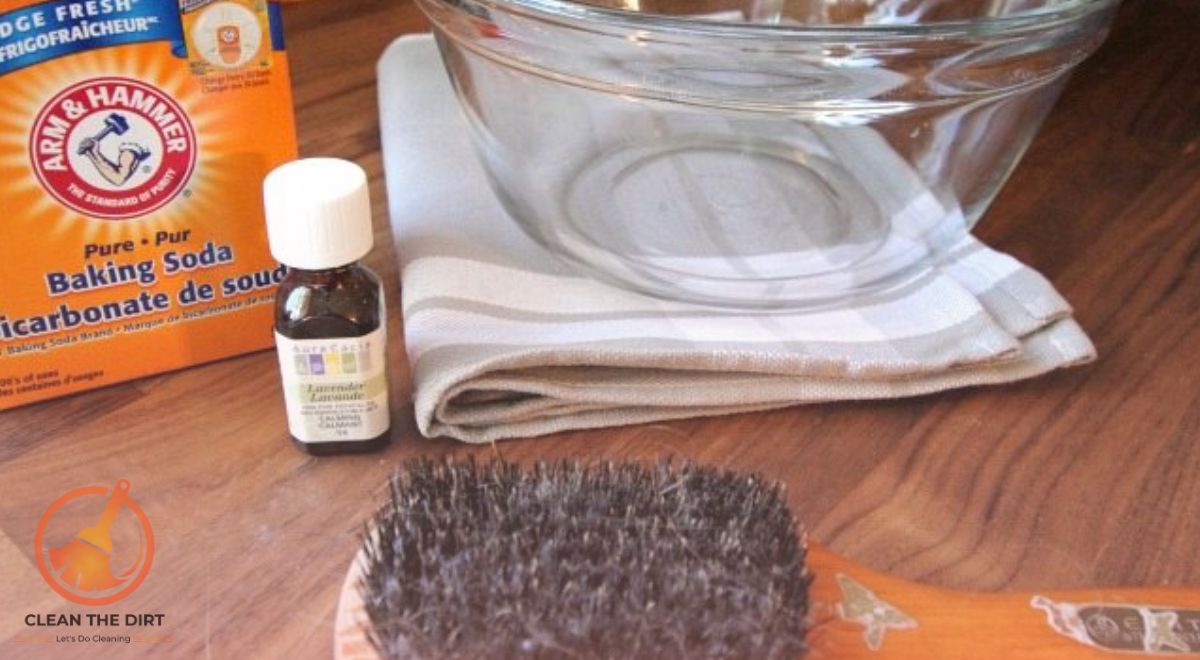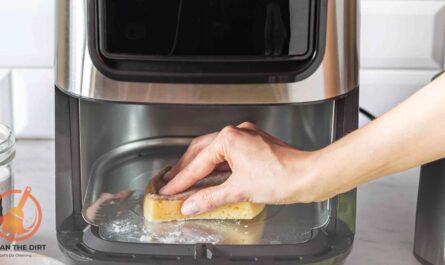Table of Contents
Introduction
Welcome to the ultimate guide on how to clean hair brushes with vinegar and baking soda. Your hairbrush might be one of the most essential tools in your beauty arsenal, but when was the last time you gave it a good clean? Over time, hair brushes accumulate oil, dirt, residue from hair products, and even bacteria, which can all find their way back into your hair, leaving it less than shiny.
Fear not. We’re here to introduce you to a simple, natural, and highly effective solution for how to clean hair brushes with vinegar and baking soda. These household staples aren’t just for cooking or cleaning countertops – they’re also powerful allies in your search for healthy, shiny hair.
In this guide, we’ll walk you through the step-by-step process of using vinegar and baking soda to clean your hair brushes, leaving them fresh, clean, and ready to help you achieve your best hair day yet. So say goodbye to dirty brushes and hello to beautifully clean strands, let’s dive in.
Preparing Your Supplies
Before you embark on your hair brush cleaning journey with vinegar and baking soda, it’s important to gather all the necessary supplies. Here’s what you’ll need for how to clean hair brushes with vinegar and baking soda.
1. Distilled White Vinegar
Choose for distilled white vinegar, as it’s a natural cleaning agent that effectively dissolves oils, residues, and buildup from hair brushes.
2. Baking Soda
Baking soda, also known as sodium bicarbonate, is a versatile household ingredient with rough properties that help to scrub away dirt and grime from your hair brushes.
3. A Cleaning Toothbrush or Comb
This will be used to remove hair and debris from the bristles of your hair brush before cleaning.
4. A Bowl
You’ll need a bowl to mix your vinegar solution and soak your hair brushes during the cleaning process.
5. Lukewarm Water
Lukewarm water will be used to create your vinegar solution and to rinse your hair brushes after cleaning.
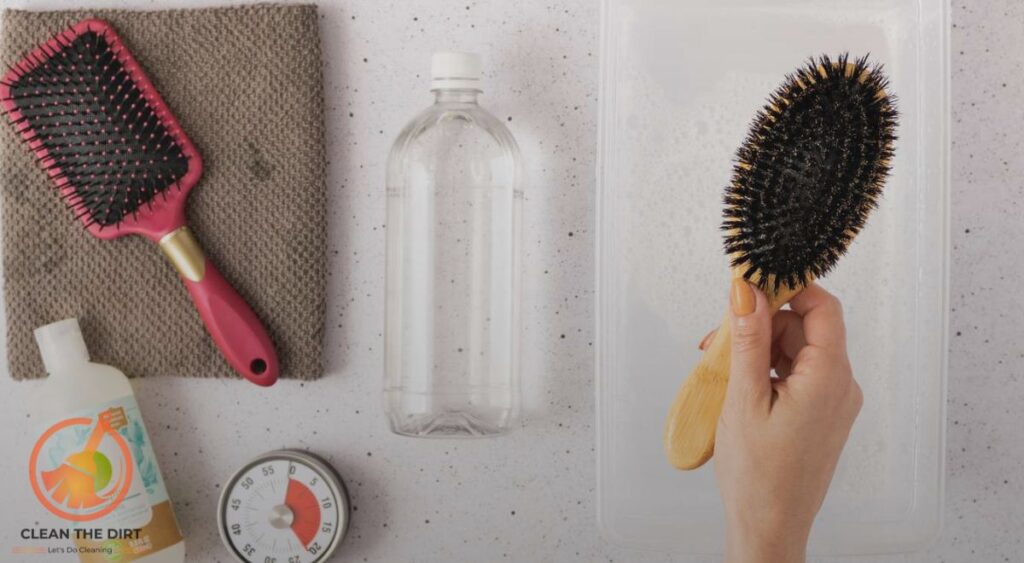
6. A Clean Towel
Have a clean towel on hand to dry your hair brushes after rinsing.
How to Clean Hair Brushes with Vinegar and Baking Soda? Step-by-Step Cleaning Process
How to Clean hair brushes with vinegar and baking soda is a simple effective process. Follow these steps to achieve beautifully clean hair brushes
1. Remove Hair and Debris
Start by removing any hair and debris from the bristles of your hair brush using a cleaning toothbrush or comb. This step helps to loosen any surface buildup and allows for a more thorough cleaning.
2. Create the Vinegar Solution
In a bowl, mix equal parts distilled white vinegar and lukewarm water to create your cleaning solution. The vinegar acts as a natural disinfectant and helps to dissolve oils and residues from the hair brush.
3. Soak the Hair Brush
Submerge the hair brush in the vinegar solution, ensuring that the bristles are fully covered. Allow the hair brush to soak for about 20-30 minutes to loosen any stubborn buildup.
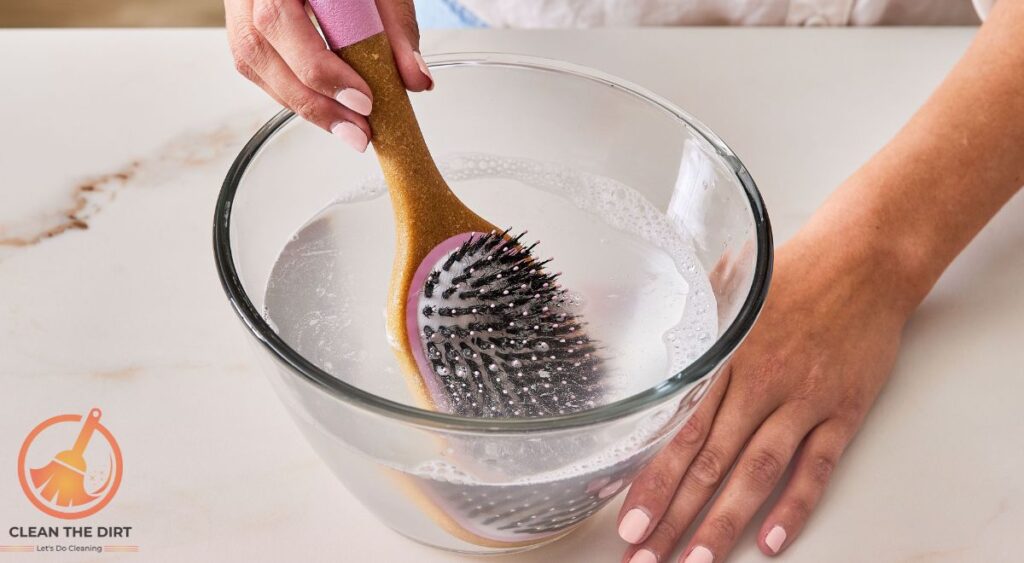
4. Scrub with Baking Soda Paste
While the hair brush is soaking, create a paste using baking soda and a small amount of water. Apply the baking soda paste to the bristles and base of the hair brush, then gently scrub with a cleaning toothbrush.
5. Rinse Thoroughly
After scrubbing with the baking soda paste, rinse the hair brush thoroughly under lukewarm water to remove any vinegar and baking soda residue. Make sure the cleaning solution is completely removed by washing.
6. Dry completely
Shake off any excess water from the hair brush and pat it dry with a clean towel. Allow the hair brush to air dry completely before using it again.
By following these simple steps, you can effectively clean your hair brushes with vinegar and baking soda, leaving them fresh, clean, and ready to use. Now, enjoy the feeling of clean hair brushes and healthier-looking hair.
Benefits of Using Vinegar and Baking Soda to Clean Hair Brushes
Cleaning your hair brushes with vinegar and baking soda offers several advantages that contribute to healthier hair and longer-lasting brushes. Here are some key benefits how to clean hair brushes with vinegar and baking soda.
1. Natural Cleaning Power
Vinegar and baking soda are both natural ingredients that have powerful cleaning properties. Vinegar acts as a natural disinfectant while baking soda provides gentle abrasion to scrub away dirt, oil, and residue from the hair brush.
2. Effective Removal of Buildup
Over time, hair brushes can accumulate oils, residues from hair products, and even bacteria. Vinegar and baking soda work together to effectively dissolve and remove this buildup, leaving your hair brushes clean and free from debris.
3. Removal of Odors
Vinegar and baking soda are also known for their ability to negate odors. By using these ingredients to clean your hair brushes, you can eliminate any unpleasant smells that may have accumulated over time.
4. Gentle on Brushes
Unlike harsh chemical cleaners, vinegar and baking soda are gentle on hair brushes and won’t cause damage to the bristles or handle. This ensures that your brushes remain in good condition for longer, prolonging their lifespan.
5. Affordable and Eco-Friendly
Vinegar and baking soda are affordable household staples that are readily available in most homes. Using these ingredients for cleaning is not only cost-effective but also environmentally friendly, as they are non-toxic and biodegradable.
6. Versatile Cleaning Solution
In addition to cleaning hair brushes, vinegar and baking soda can be used for a variety of household cleaning tasks. From scrubbing sinks to freshening up laundry, these ingredients offer versatile cleaning solutions for your entire home.
Understanding the Importance of Clean Hair Brushes
Maintaining clean hair brushes is more than just a cosmetic concern. It’s a vital part of overall hair health and hygiene. Let’s dive into why clean hair brushes are essential and how incorporating “How to Clean Hair Brushes with Vinegar and Baking Soda” into your routine can make a significant difference.
1. Preventing Buildup
Hair brushes accumulate not only hair but also oils, dirt, dead skin cells, and residue from hair products over time. This buildup can clog the bristles, hindering their ability to distribute natural oils along the hair shaft and scalp. Regular cleaning with vinegar and baking soda helps dissolve and remove this buildup, ensuring your brushes remain effective in promoting healthy hair.
2. Maintaining Scalp Health
Dirty hair brushes can harbor bacteria and fungi, which can transfer to your scalp during brushing. This can lead to irritation, itching, and even infections. By cleaning your hair brushes regularly, you remove these pathogens, promoting a clean and healthy scalp environment.
3. Reducing Hair Damage
Buildup on hair brushes can cause friction and tugging on the hair shaft, leading to breakage, split ends, and damage. Clean brushes glide smoothly through the hair, minimizing the risk of mechanical damage and keeping your locks healthy and strong.
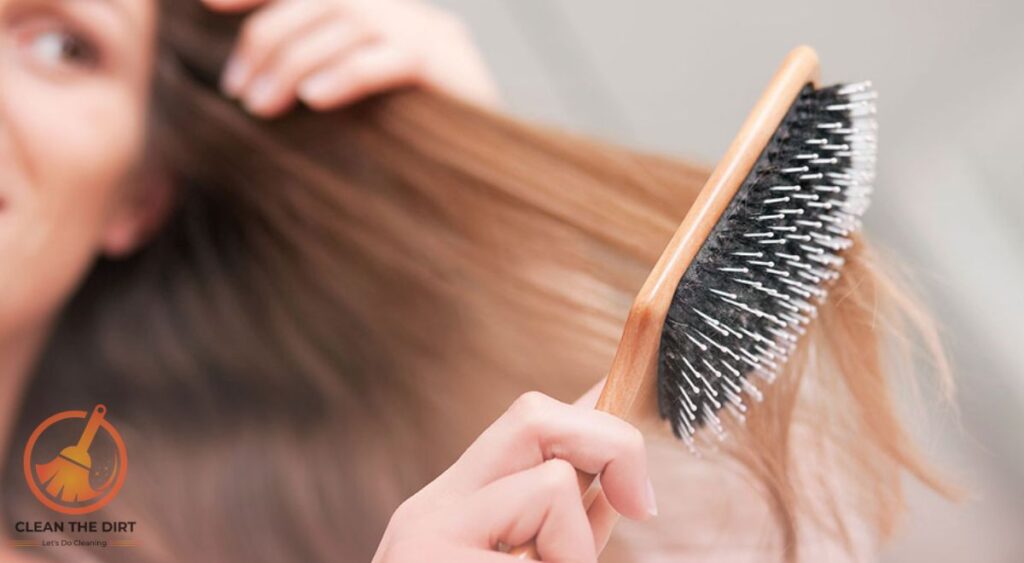
4. Enhancing Styling Results
Clean brushes provide better grip and control when styling your hair, allowing for smoother and more polished results. Removing residue from hair products ensures that your hair maintains its natural texture and shine, enhancing the overall look of your hairstyle.
5. Prolonging Brush Lifespan
Regular cleaning not only keeps your hair brushes hygienic but also extends their lifespan. Clean brushes are less prone to damage and bristle breakage, ensuring they remain effective for longer periods.
Additional Tricks and Tips on “How to Clean Hair Brushes with Vinegar and Baking Soda”
Cleaning your hair brushes with vinegar and baking soda can yield fantastic results, but here are a few extra tips and tricks for How to Clean Hair Brushes with Vinegar and Baking Soda.
1. Regular Maintenance
Make it a habit to clean your hair brushes regularly, ideally once a month or more frequently if you use a lot of hair products. This prevents buildup from accumulating and keeps your brushes in top condition.
2. Remove Hair Daily
After each use, take a moment to remove any hair trapped in the bristles of your brush. Using a comb or cleaning tool, gently lift the hair out to prevent it from tangling and becoming more difficult to remove later.
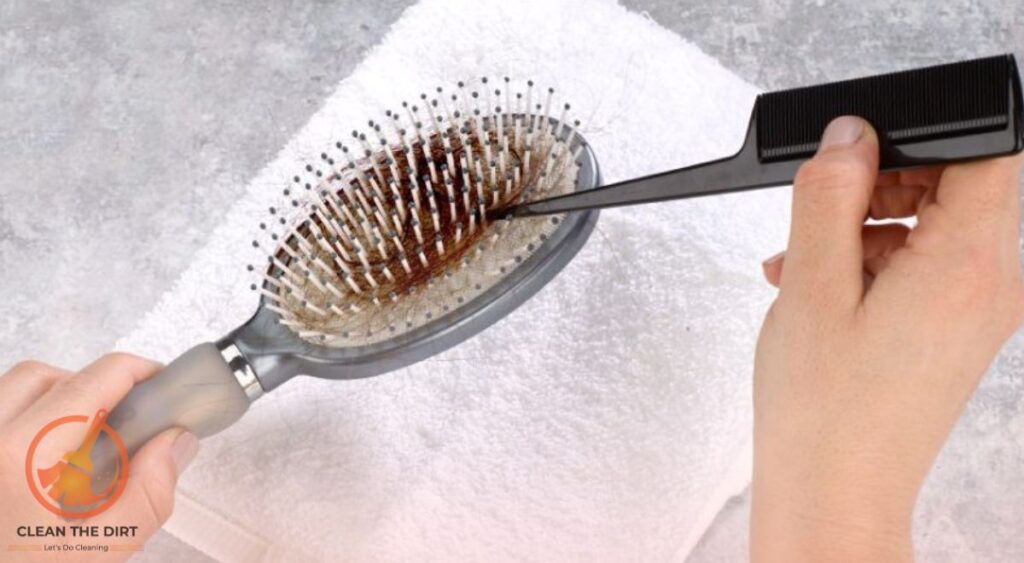
3. Soak Brushes Longer for Stubborn Buildup
If you notice stubborn buildup on your hair brushes, consider soaking them in the vinegar solution for a longer period, up to an hour, or overnight. This extra soaking time can help dissolve tough residues more effectively.
4. Use a Toothbrush for Detailing
For detailed cleaning, such as scrubbing between bristles or cleaning the base of the brush, use an old toothbrush. The small bristles are perfect for reaching tight spaces and ensuring a thorough clean.
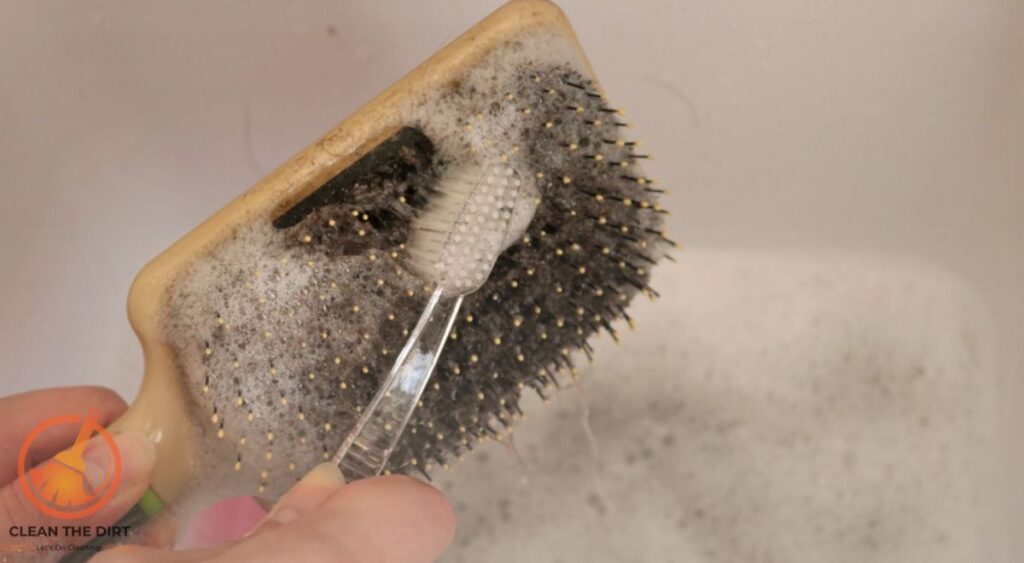
5. Dry Brushes Completely
After cleaning, ensure your hair brushes are completely dry before using them again. Excess moisture can lead to mold and mildew growth, so allow your brushes to air dry in a well-ventilated area before storing them.
6. Store Brushes Properly
To prevent dust and debris from accumulating on your clean hair brushes, store them in a clean, dry area away from moisture and humidity. Consider using a brush holder or container to keep them organized and protected.
Conclusion
Congratulations on mastering the art of “How to Clean Hair Brushes with Vinegar and Baking Soda”. By incorporating this natural and effective cleaning method into your hair care routine, you’ve taken a significant step towards healthier, more radiant hair.
As you’ve learned, vinegar and baking soda offer numerous benefits for cleaning hair brushes, including their natural cleaning power, effectiveness in removing buildup, and affordability. With regular maintenance and the use of these household staples, you can keep your hair brushes clean, hygienic, and in excellent condition for years to come.
Remember, clean hair brushes not only contribute to healthier hair but also enhance the performance of your styling tools. By removing buildup and residues, you’ll achieve smoother, more polished results with every brush stroke.
We hope this guide has been informative and helpful in your journey towards cleaner, healthier hair brushes. Now, armed with the knowledge and techniques you’ve learned, go ahead and enjoy the feeling of fresh, revitalized brushes and the confidence that comes with knowing you’re taking excellent care of your hair.
Here’s a comparison table highlighting the differences between cleaning hair brushes with vinegar and baking soda compared to other methods.
| Aspect | Vinegar and Baking Soda Method | Commercial Brush Cleaner | Dish Soap and Water |
| Cleaning Effectiveness | Effective at removing buildup and odors from hair brushes | May vary depending on the brand and formula | Moderate effectiveness, may not remove stubborn buildup |
| Natural Ingredients | Yes, vinegar and baking soda are natural and non-toxic | Some may contain harsh chemicals | Yes, but may contain artificial fragrances and additives |
| Cost | Low, both vinegar and baking soda are inexpensive | Varies, depending on the brand and size of the cleaner | Low, dish soap is usually affordable |
| Odor Removal | Effective at neutralizing odors | May have added fragrances to mask odors | May not completely eliminate odors |
| Abrasiveness | Baking soda provides gentle abrasion to scrub away buildup | Depends on the formulation, some may be abrasive | Generally gentle, but may not provide deep cleaning |
| Environmental Impact | Minimal, both vinegar and baking soda are biodegradable | Some may contain harsh chemicals that can be harmful to the environment | Depends on the dish soap formulation |
This comparison table provides a quick overview of the differences between cleaning hair brushes with vinegar and baking soda versus other methods. Users can consider these factors when deciding which method best suits their needs and preferences.
Frequently Asked Questions (FAQs)
Is it safe to use vinegar and baking soda on all types of hair brushes?
Yes, vinegar and baking soda are safe for use on most types of hair brushes, including plastic, wooden, and ceramic brushes. However, it’s always a good idea to check the manufacturer’s instructions for any specific cleaning recommendations.
Will vinegar and baking soda leave a strong odor on my hair brushes?
While vinegar has a strong odor initially, it dissipates as the brushes dry. Additionally, the odor can be masked by rinsing the brushes thoroughly after cleaning and allowing them to air dry completely.
How often should I clean my hair brushes with vinegar and baking soda?
It’s recommended to clean your hair brushes with vinegar and baking soda at least once a month to prevent buildup and maintain optimal hygiene. However, if you use a lot of hair products or have oily hair, more frequent cleaning may be necessary.
Can I use this cleaning method on hair brushes with natural bristles?
Yes, you can use vinegar and baking soda to clean hair brushes with natural bristles. However, it’s important to be gentle during the cleaning process to avoid damaging the delicate bristles. Avoid soaking natural bristle brushes for prolonged periods and rinse them thoroughly after cleaning.
Will vinegar and baking soda damage my hair brushes?
When used properly, vinegar and baking soda are gentle on hair brushes and shouldn’t cause damage. However, it’s essential to rinse the brushes thoroughly after cleaning to remove any residue. Additionally, avoid using hot water, which can cause damage to certain types of brushes.
Can I use vinegar and baking soda to clean other hair accessories, such as combs and hair clips?
Yes, you can use vinegar and baking soda to clean other hair accessories, such as combs and hair clips. Follow the same cleaning process outlined for hair brushes, ensuring thorough rinsing to remove any residue.
You May Also Like: How to Clean Down Pillows? Expert Tips and Tricks

